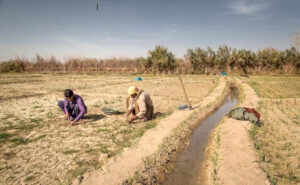KABUL (SW) – Through a series of 29 exclusive and statistical reports, Salam Afghanistan Media Organization’s Omid (Hope) program has shed light on the grim challenges and promising opportunities faced by the Afghan youths.
Introduction
Salam Watandar Radio Station, through its “Omid” (Hope) program, has been actively supporting the youths of Afghanistan, offering opportunities to improve their situation. This program aims to enhance the spirit of young people, providing educational and employment opportunities while addressing their daily challenges.
The program collected realistic data on youths’ conditions through field surveys and statistical analyses, aiming to provide practical and effective solutions. Additionally, Salam Watandar has launched a 24-hour helpline, allowing youths to address their issues and receive specialized counseling. To date, the helpline has provided consultations to 276 young people, successfully resolving issues for 19 individuals.
The program’s staff, with tireless efforts in both urban and rural areas, delivered messages of hope and new opportunities to thousands of young people across Afghanistan via the Salam Watandar radio network. A summary of the surveys results reveal that in recent years, youths have faced a range of challenges in economic, employment, cultural, educational, and social areas.
Rapid political and economic changes, increasing restrictions, and social crises have deeply impacted young people’s lives.
Research and reports by Salam Watandar, based on extensive surveys and interviews with hundreds of young people, provide a comprehensive picture of their current situation. These reports show that high unemployment rates, lack of financial independence, educational challenges, legal issues, and lack of equal access to job market opportunities have significantly affected youths, causing anxiety and shifts in their attitudes and approaches to various issues.
Despite these limitations and challenges, young Afghans are striving to find creative solutions and entrepreneurial paths to improve their conditions.
Summary of the reports
From April to October of 2024, Salam Watandar has compiled 29 statistical reports on youths in Afghanistan across 9 different sectors. These reports involved 4,436 respondents, with their education level, age, and gender analyzed by province.
Findings from these 29 reports show that 1,966 young people (45.8%) hold a bachelor’s degree, 98 (2.3%) have a master’s degree, 16 (0.4%) hold a Ph.D., 192 (4.5%) have completed post-graduate, 1,100 (25.7%) are high school graduates, 345 (8%) are still university students, 67 (1.5%) are school students, and 504 (11.8%) are illiterate. Additionally, 146 respondents did not disclose their education level.
The surveys’ participants were from different age groups, with 41.3% aged 20-25, 23.2% aged 5-15, 20.23% aged 25-30, and 12% between 30-35 years old.
The gender distribution revealed that 2,010 (45.3%) were female and 2,385 (53.8%) were male, while 39 (0.9%) did not answer the gender-related question through online questionnaire.
Surveys were conducted across 34 provinces, with Kabul leading at 33.7%, followed by Jowzjan at 5.9%, Badakhshan at 5.7%, Takhar at 4.9%, Kapisa at 4.6%, and Nuristan at 0.1%.
Salam Watandar, through its 24-hour helpline, allows young people to raise their issues individually and receive specialized counseling. So far, this helpline has provided counseling to 276 young people and has permanently solved the problems of 19 individuals.
The findings of Salam Watandar’s surveys show that the economic and employment situation of young people, especially after recent political upheavals and the imposition of severe restrictions on the job market, has worsened. 60% of eligible young people are unemployed and face challenges such as a lack of meritocracy, a mismatch between their field of study and work, and infrastructural problems like high internet costs.
In social and cultural areas, young people have shared their views on participating in voluntary social programs and adopting a modern lifestyle alongside traditions. Most urban youths oppose polygamy and emphasize the formation of small and sustainable families. In addition, cultural and social problems have led to a decrease in their participation in voluntary social and cultural programs, with many showing a preference for a lifestyle that blends traditional and modern styles.
In the area of rights, the findings indicate that the individual rights of young people, especially women, are often ignored by families. In education, a significant decline in educational progress has been observed, partly due to economic challenges, lack of family support, and political instability.
This year, the number of male participants in the university entrance exam (Kankor) has decreased by half, and many young people are now focusing on learning foreign languages for migration and improving their job prospects.
In the fields of health and sports, interest has increased; however, young people face difficulties in maintaining regular sports routines due to limited facilities and financial constraints. The reports highlight the need to improve sports infrastructure and increase access to facilities.
In the technology sector, young people are interested in new technologies, but limited internet access and a lack of opportunities have prevented them from fully benefiting from these technologies.
In terms of migration, young people are seeking better opportunities abroad due to the economic and security crisis. The lack of proper job and educational opportunities, reduced family support, and insecurity are the main reasons for leaving Afghanistan.
In the entertainment sector, interest in home-based and online activities has increased due to the poor social conditions. The interest in social media has also grown, with many using these platforms to express their views and connect with friends.
An overview of the economic and employment situation of youths
A conversation with 221 young people across six reports reveals that the employment and financial situation of young people, particularly after recent political changes, has become more critical due to restrictions and the closure of several institutions. Out of these, 15 youngsters said they are engaged in online work, 10 were entrepreneurs, and 30 were unemployed.
Further discussions were held with 20 other young people regarding the impact of financial independence, with 112 young people discussing the alignment of their education with their work field, and 34 others discussing the comparative benefit of having a profession alongside education.
One of the reports indicates that about 60% of eligible young people are unemployed, and factors like political upheavals, job restrictions, lack of meritocracy, and the mismatch between their field of study and available jobs, along with the spread of COVID-19, have exacerbated the crisis.
Women, in particular, face more severe restrictions, which has contributed to higher unemployment among them. Infrastructural challenges such as weak internet and high costs, along with insufficient government support, have made it difficult for young people to engage in entrepreneurial activities.
These reports indicate that unemployment and lack of financial independence, combined with economic and social challenges, have led to a decrease in self-confidence and increased stress among some young people. However, many have turned to creativity, skill acquisition, and entrepreneurship, creating new job opportunities for themselves. E-commerce, activities in the handicrafts sector, and establishing businesses based on market needs are among these initiatives.
The de-facto government has tried to reduce unemployment through capacity-building programs and job creation efforts, but due to high unemployment rates, job restrictions, and infrastructural challenges, these actions have proven insufficient, highlighting the need for more support and improved infrastructure.
Links of the reports:
https://swn.af/en/2024/04/afghan-youth-embrace-online-work-opportunities-in-growing-trend/
https://swn.af/en/2024/05/exclusive-educated-experienced-youth-struggling-to-find-jobs/
https://swn.af/en/2024/06/youngsters-link-quality-of-life-to-financial-independence/
https://swn.af/en/2024/10/survey-reveals-23-3-of-afghan-youths-in-misaligned-jobs/
https://swn.af/en/2024/10/exclusive-youngsters-grow-trust-in-skills-to-complement-education/
The cultural and social role of youths
In today’s world, where rapid social and cultural changes are taking place, young people play a pivotal role in shaping the future. Therefore, Salam Watandar, through four reports (celebrating special days, lifestyle, social activity, and young people’s views on polygamy) and conversations with 1,444 young people, has studied their perspectives on cultural and social matters. Among them, 70 young people discussed their interest in participating in voluntary social programs, 800 shared their views on polygamy, 20 discussed their excitement for celebrating holidays, and 554 expressed their opinions on lifestyle.
These reports reveal that young people’s views on cultural and social issues are changing, influenced by their understanding of economic conditions and individual rights. They are affected by gender equality and future outlooks for personal success. The findings show that most young people, especially in urban areas, strongly oppose polygamy. 87.9% of urban youths and 64% of rural youths reject this practice. Economic and social factors, such as unemployment, are major reasons for rejecting polygamy, as men are unable to provide for multiple wives, and the inability to maintain fairness between spouses causes emotional and psychological issues. As a result, the younger generation of Afghanistan leans towards forming families with one partner and establishing stable and equal family relationships.
Reports on social participation reveal that Afghanistan’s cultural and social conditions have faced numerous challenges in recent years, affecting young people’s involvement in voluntary social programs. Social and cultural restrictions, lack of awareness, social harassment, unemployment, migration, and lack of family support have been the key reasons for the decline in young people’s participation in voluntary programs.
Findings from Salam Watandar’s study on the lifestyle of young people show that the majority seek a blend of both traditional and modern styles. While they prefer modern approaches to work, education, and making life easier, they combine these with traditional practices when it comes to family matters, celebrating cultural holidays, music, and clothing.
The findings also reveal that young people’s attitudes and enthusiasm toward cultural and festive days vary, yet there is still a strong interest in celebrating these occasions.
Links of the reports:
https://swn.af/en/2024/06/afghan-youths-share-diverse-plans-for-celebrating-eid-al-adha/
https://swn.af/en/2024/09/exclusive-afghan-youths-losing-fate-in-voluntary-social-activities/
https://swn.af/en/2024/09/exclusive-survey-reveals-8-out-of-every-10-afghan-youths-reject-polygamy/
Youths and legal challenges
Salam Watandar’s findings from three reports on young people’s rights (the right to choose, the right to marry, and the privacy of couples) show that the legal status of this group, particularly women, is concerning. Many young women are deprived of basic rights such as the right to choose their marriage, education, and employment. Among 88 interviewed young people, many face challenges in exercising their right to marry due to economic and cultural difficulties. Some lack independence in their married life, and often, their privacy and fundamental rights as couples are violated by families and friends, leading to regret about marriage for many young people.
On the other hand, findings regarding the right to choose show that young women are more deprived of this right than men. This highlights the need to promote a culture of respect for individual rights and create supportive laws for young people.
Links of the reports:
https://swn.af/en/2024/08/young-couples-irked-by-family-interference-in-personal-affairs/
Youths and personality development
Salam Watandar, through three reports (goal setting, role models, and their influence), has examined the process of young people’s personality development. According to the reports, this development is influenced by multiple factors, some of which may negatively affect the formation of individual and collective identity. Negative factors include the lack of a clear goal, educational limitations, economic problems, and despair for the future. Overall, it can be said that the prevailing social, economic, and political conditions in Afghanistan have created fewer opportunities for the growth and development of young people’s personalities.
However, the reports show that many young people, despite challenges, have chosen role models in their lives, mostly successful individuals in various fields. These choices have directly impacted their motivation and progress.
In general, young people’s personality development depends on their social, economic, and educational conditions. If appropriate opportunities for education, employment, and proper guidance are provided, it can be expected that young people will move towards personal and social development, choosing positive role models and clear goals for their success.
Links of the reports:
https://swn.af/en/2024/09/disability-is-not-inability-inspiring-tales-of-afghan-youths/
Opportunities and challenges in education
Salam Watandar has conducted interviews with 437 young people across four reports to examine the educational conditions of youngsters. The interviews reveal a significant decline in the level of education in Afghanistan. The reports address factors contributing to this decline, such as educational barriers for girls, political instability in recent years, its impact on the hopefulness of young people, economic challenges, cultural barriers, and the lack of family support for children’s education. As a result, the educational level of young people faces significant challenges.
One report on the number of Kankor participants this year reveals that the number of male participants in the university entrance exam has halved compared to previous years. Another report shows that young people’s interest in learning foreign languages has increased, with many indicating their goal of learning languages for migration and improving their job prospects. The reports also reviewed reading habits, revealing a decrease in the motivation for reading among young people.
Links of the reports:
https://swn.af/en/2024/07/youngsters-seek-migration-avenues-by-learning-foreign-languages/
Sports and health
Salam Watandar’s findings in the field of health and sports, through four reports and conversations with 816 young people, show that young people are interested in sports, but face obstacles such as limited time, financial constraints, and lack of family support. Although 65% of 751 surveyed youngsters engage in sports, 35% are unable to do so due to economic, social, and infrastructural challenges. Gender differences are also evident, with more young men engaging in sports, while women focus more on beauty and fitness.
Findings from Salam Watandar’s survey show that, despite challenges, sports competitions among young people have increased. The de-facto government has also implemented strengthening programs for certain sports disciplines. This report emphasizes the need for lifestyle changes, greater awareness, and improved social and sports conditions to address the health and athletic challenges faced by youths.
The survey also reveals that age-related illnesses among youths have risen due to a lack of physical activity, poor nutrition, psychological stress, and obesity.
Links of the reports:
https://swn.af/en/2024/10/easy-access-to-narcotics-keeps-afghan-youths-in-chain-of-addiction/
Youths and technology
Salam Watandar’s three reports on young people’s access to technology, the impact of social media on couples’ relationships, and the role of smartphones in young people’s lives, show that technology can provide an opportunity for young people to advance and increase their awareness. However, limited access to the internet and misuse of it can create serious issues in their social lives.
Links of the reports:
https://swn.af/en/2024/05/limited-access-to-technology-internet-for-afghan-youths/
https://swn.af/en/2024/10/exclusive-smartphones-becoming-key-aspects-of-afghan-youths-lives/
Youths and entertainment
Salam Watandar conducted interviews with 33 young people across 11 provinces to examine how young people access healthy and desirable entertainment. The interviews show that 25 of them do not have access to such entertainment.
Lack of recreational venues, poverty, unemployment, and restrictions have decreased young people’s access to healthy entertainment. Female interviewees stated that recreational venues are not safe for them, which adds to the challenges they face.
Sociologists and psychologists have emphasized that leisure activities are essential for mental health. Women’s rights activists have called for the reopening of recreational spaces for women. The de-facto government officials, including Kabul’s municipal authorities and the Olympic Committee, have stated that 141 parks are currently operational in Kabul, with plans underway to improve recreational conditions.
Links of the reports:
https://swn.af/en/2024/08/exclusive-dearth-of-recreational-spots-irk-youngsters/
Youths and migration
A report by Salam Watandar, based on a survey of 312 families in Kabul, reveals that 77% of them have experienced the migration of at least one family member. Most of these migrations took place in the past three years due to economic hardships, a lack of hope for the future, and insecurity.
At least 83% of respondents expressed a desire to leave Afghanistan in search of a better life. Sociologists have warned that the migration of Afghanistan’s workforce could cause serious harm to the country’s economy and development. To reduce the motivation for youths migration, efforts should be focused on improving employment programs, food security, educational opportunities, and motivational initiatives.
Links of the reports:
https://swn.af/en/2024/04/exclusive-the-escalating-trend-of-youth-migration-and-its-consequences/
Coordination with organizations
In its social responsibility towards youths and Afghanistan, Salam Watandar collaborates with various organizations that operate in different sectors to address the needs of young people by utilizing the opportunities these organizations provide. To achieve this goal, Salam Watandar has reached agreements with five organizations working in the fields of legal aid, psychological support, education, and employment. These agreements have created opportunities for youths in work, education, and training, and many young individuals have been introduced to these organizations.
Salam Watandar Helpline
From April 26 to November 5 of 2024, the Salam Watandar Helpline received 276 calls and messages from young people. Of these, 263 requested counseling in areas such as employment, legal assistance, health, psychology, and CV building. 13 individuals requested more information about the “Omid” (Hope) program. The calls came from 19 provinces, with the highest number coming from the central region.
The number of calls ranged from 40 to 58 per week. Of the total contacts, 232 were from males and 44 from females. After receiving counseling, 19 individuals expressed gratitude for the resolution of their problems.
Various programs, such as “Omid” (Hope), ” Jan-e-Jor” (Healthy Body), “Haq-e-Man” (My Right), and “Parwaz” (Flight), along with coordination with external organizations, have helped address the challenges faced by young people.
Recommendations
The following recommendations aim to improve the living conditions of youths in the areas of legal rights, social participation, education, and technology, so that they can feel more confident and hopeful about their future and play a constructive role in society.
Legal sector: Awareness programs and protective laws should be developed for young people. Many youths face violations of their basic rights due to unawareness. Educational initiatives can help them become informed about their personal and social rights, preventing legal problems and exploitation.
Social sector: Families and government institutions should create conducive conditions for active youths participation in society. Findings show that restrictions imposed by families or the government have reduced youths’ interest in social activities. Providing opportunities for social engagement and offering more support can motivate them to be more active in society and foster personal growth.
Educational sector: Motivational and supportive programs should be designed for youths. Such programs can enhance hope for academic success and improve the quality of education in Afghanistan. Creating a dynamic and encouraging environment will inspire young people to pursue education and scientific advancement.
Technology sector: Access to modern technologies should be made easier for youths, and the quality of the internet should be improved. By controlling internet costs and establishing appropriate regulations, particularly in setting age restrictions for social media use, online abuse can be prevented, enabling youths to make more efficient use of technology.






